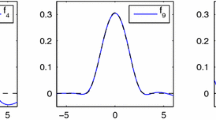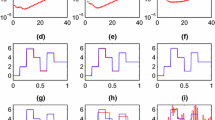Abstract
The LSQR iterative method is one of the most popular numerical schemes for computing an approximate solution of large linear discrete ill-posed problems with an error-contaminated right-hand side, which represents available data. It is important to terminate the iterations after a suitable number of steps, because too many steps yield an approximate solution that suffers from a large propagated error due to the error in the data, and too few iterations give an approximate solution that may lack many details that can be of interest. When the error in the right-hand side is white Gaussian and a tight bound on its variance is known, the discrepancy principle typically furnishes a suitable termination criterion for the LSQR iterations. However, in many applications in science and engineering that give rise to large linear discrete ill-posed problems, the variance of the error is not known. This has spurred the development of a variety of stopping rules for assessing when to terminate the iterations in this situation. The present paper proposes new simple stopping rules that are based on comparing the residual errors associated with iterates generated by the LSQR and Craig iterative methods.






Similar content being viewed by others
References
Baart, M.L.: The use of auto-correlation for pseudorank determination in noisy ill-conditioned linear least-squares problems. IMA J. Numer. Anal. 2, 241–247 (1982)
Bauer, F., Kindermann, S.: The quasi-optimality criterion for classical inverse problems. Inverse Problems 24, 035002 (2008). (20pp)
Bauer, F., Lukas, M.A.: Comparing parameter choice methods for regularization of ill-posed problems. Math. Comput. Simulation 81, 1795–1841 (2011)
Bouhamidi, A., Jbilou, K., Reichel, L., Sadok, H., Wang, Z.: Vector extrapolation applied to truncated singular value decomposition and truncated iteration. J. Eng. Math. 93, 99–112 (2015)
Brezinski, C., Redivo Zaglia, M., Rodriguez, G., Seatzu, S.: Extrapolation techniques for ill-conditioned linear systems. Numer. Math. 81, 1–29 (1998)
Brezinski, C., Rodriguez, G., Seatzu, S.: Error estimates for linear systems with applications to regularization. Numer. Algorithms 49, 85–104 (2008)
Brezinski, C., Rodriguez, G., Seatzu, S.: Error estimates for the regularization of least squares problems. Numer. Algorithms 51, 61–76 (2009)
Fenu, C., Reichel, L., Rodriguez, G., Sadok, H.: GCV for Tikhonov regularization by partial SVD. BIT Numer. Math. 57, 1019–1039 (2017)
Fox, L., Goodwin, E.T.: The numerical solution of non-singular linear integral equations. Philos. Trans. Roy. Soc. London. Ser. A. 245, 501–534 (1953)
Hanke, M.: On Lanczos based methods for the regularization of discrete ill-posed problems. BIT Numer. Math. 41, 1008–1018 (2001)
Hansen, P.C.: Analysis of discrete ill-posed problems by means of the L-curve. SIAM Rev. 34, 561–580 (1992)
Hansen, P.C.: Rank-deficient and discrete ill-Posed problems: Numerical aspects of linear inversion. SIAM, Philadelphia (1998)
Hansen, P.C.: Regularization Tools version 4.0 for Matlab 7.3. Numer. Algorithms 46, 189–194 (2007)
Hansen, P.C.: Discrete inverse problems: insight and algorithms. SIAM, Philadelphia (2010)
Hochstenbach, M.E., Reichel, L., Rodriguez, G.: Regularization parameter determination for discrete ill-posed problems. J. Comput. Appl. Math. 273, 132–149 (2015)
Kindermann, S.: Convergence analysis of minimization-based noise level-free parameter choice rules for linear ill-posed problems. Electron. Trans. Numer. Anal. 38, 233–257 (2011)
Meurant, G.: Computer solution of large linear systems. Elsevier, Amsterdam (1999)
Meurant, G.: The Lanczos and conjugate gradient algorithms. SIAM, Philadelphia (2006)
Morigi, S., Reichel, L., Sgallari, F., Zama, F.: Iterative methods for ill-posed problems and semiconvergent sequences. J. Comput. Appl. Math. 193, 157–167 (2006)
Paige, C.C.: Bidiagonalization of matrices and solutions of linear equations. SIAM J. Numer. Anal. 11, 197–209 (1974)
Paige, C.C., Saunders, M.A.: LSQR: An algorithm for sparse linear equations and sparse least squares. ACM Trans. Math. Soft. 8, 43–71 (1982)
Park, Y., Reichel, L., Rodriguez, G., Yu, X.: Parameter determination for Tikhonov regularization problems in general form. J. Comput. Appl. Math. 343, 12–25 (2018)
Phillips, D.L.: A technique for the numerical solution of certain integral equations of the first kind. J. Assoc. Comput. Mach. 9, 84–97 (1962)
Regińska, T.: A regularization parameter in discrete ill-posed problems. SIAM J. Sci. Comput. 17, 740–749 (1996)
Reichel, L., Rodriguez, G.: Old and new parameter choice rules for discrete ill-posed problems. Numer. Algorithms 63, 65–87 (2013)
Reichel, L., Sadok, H.: A new L-curve for ill-posed problems. J. Comput. Appl. Math. 219, 493–508 (2008)
Saunders, M.A.: Solution of sparse rectangular systems using LSQR and Craig. BIT Numer. Math. 35, 588–604 (1995)
Shaw, C.B. Jr.: Improvement of the resolution of an instrument by numerical solution of an integral equation. J. Math. Anal. Appl. 37, 83–112 (1972)
Wilkinson, J.H.: The algebraic eigenvalue problem. Oxford University Press, New York (1965)
Acknowledgments
The authors would like to thank the referees for comments that lead to improvements of the presentation. The first author would like to thank the second author for an enjoyable visit to the Université du Littoral, during which this work was initiated. Research by the first author was supported in part by NSF grants DMS-1720259 and DMS-1729509. Research by the third author was supported by the China Scholarship Council (CSC No. 201806180081).
Author information
Authors and Affiliations
Corresponding author
Additional information
Dedicated to Gérard Meurant on the occasion of his 70th birthday.
Publisher’s note
Springer Nature remains neutral with regard to jurisdictional claims in published maps and institutional affiliations.
Rights and permissions
About this article
Cite this article
Reichel, L., Sadok, H. & Zhang, WH. Simple stopping criteria for the LSQR method applied to discrete ill-posed problems. Numer Algor 84, 1381–1395 (2020). https://doi.org/10.1007/s11075-019-00852-1
Received:
Accepted:
Published:
Issue Date:
DOI: https://doi.org/10.1007/s11075-019-00852-1




